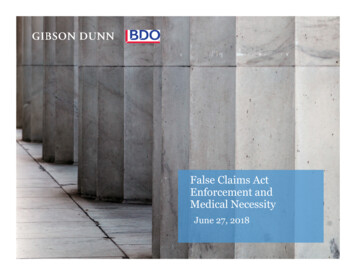
Transcription
Principles forBusinesses
PRIN ContentsPrinciples for BusinessesPRIN 11.11.21 Annex 1PRIN 22.1PRIN 33.13.23.33.4PRIN 44.1IntroductionApplication and purposeClients and the PrinciplesNon-designated investment business - clients that a firm may treat as aneligible counterparty for the purposes of PRINThe PrinciplesThe PrinciplesRules about applicationWho?What?Where?GeneralPrinciples: MiFID businessPrinciples: MiFID businessTransitional provisions and SchedulesTP 1Sch 1Sch 2Sch 3Sch 4Sch 5Sch 6PRIN–iTransitional provisionsRecord Keeping RequirementsNotification requirementsFees and other required paymentsPowers ExercisedRights of action for damagesRules that can be waivedwww.handbook.fca.org.uk Release 22 Aug 2022
Principles for BusinessesChapter 1Introduction Release 22 Aug 2022www.handbook.fca.org.ukPRIN 1/1
PRIN 1 : IntroductionSection 1.1 : Application and purpose11.1Application and purposeApplication.1.1.1GThe Principles (see PRIN 2) apply in whole or in part to every firm. Theapplication of the Principles is modified for firms conducting MiFID businessand Annex II benchmark administrators. PRIN 3 (Rules about application)specifies to whom, to what and where the Principles apply.1.1.1AGThe Principles also apply to certain payment service providers and electronicmoney issuers that are not firms. PRIN 3.1.1AR sets out the application ofthe Principles to these persons. The references to a firm in PRIN 2 includessuch persons.Purpose.1.1.2GThe Principles are a general statement of the fundamental obligations offirms and the other persons to whom they apply under the regulatorysystem. They derive their authority from the FCA’s rule-making powers as setout in the Act, including as applied by the Payment Services Regulations andthe Electronic Money Regulations, and reflect the statutory objectives.1.1.3G[deleted]Linkto fit and proper standard.PRIN 1/21.1.4GIn substance, the Principles express the main dimensions of the "fit andproper" standard set for firms in threshold condition 5 (Suitability), althoughthey do not derive their authority from that standard or exhaust itsimplications. Being ready, willing and organised to abide by the Principles istherefore a critical factor in applications for Part 4A permission, andbreaching the Principles may call into question whether a firm with Part 4Apermission is still fit and proper.1.1.4AGFor persons authorised or registered under the Payment Services Regulationsor the Electronic Money Regulations, the relevant “fit and proper standards”are the standards set in those Regulations.www.handbook.fca.org.uk Release 22 Aug 2022
PRIN 1 : IntroductionSection 1.1 : Application and purposeTakinggroup activities into account.1.1.5G1Principles 3 (Management and control), 4 (Financial prudence) and (in so faras it relates to disclosing to the FCA ) 11 (Relations with regulators) take intoaccount the activities of members of a firm's group. Compliance by anotherperson to whom the Principles apply with Principles 3, 4 and 11 can also beaffected by the activities of other persons who are members of their group.This does not mean that, for example, inadequacy of a group member's riskmanagement systems or resources will automatically lead to a firmcontravening Principle 3 or 4. Rather, the potential impact of a groupmember's activities (and, for example, risk management systems operatingon a group basis) will be relevant in determining the adequacy of the firm'srisk management systems or resources respectively.Standardsin markets outside the United Kingdom.1.1.6GAs set out in PRIN 3.3 (Where?), Principles 1 (Integrity), 2 (Skill, care anddiligence) and 3 (Management and control) apply to world-wide activities ina prudential context. Principle 5 (Market conduct) applies to world-wideactivities which might have a negative effect on confidence in the UKfinancial system. In considering whether to take regulatory action underthese Principles in relation to activities carried on outside the UnitedKingdom, the FCA will take into account the standards expected in themarket in which the firm or other person to whom the Principles apply isoperating. Principle 11 (Relations with regulators) applies to world-wideactivities; in considering whether to take regulatory action under Principle 11in relation to cooperation with an overseas regulator, the FCA will haveregard to the extent of, and limits to, the duties owed by the firm or otherperson to that regulator. (Principle 4 (Financial prudence) also applies toworld-wide activities.)1.1.6AG PRIN 4 (Principles : MiFID Business) provides guidance on the application ofthe Principles to MiFID business.Consequencesof breaching the Principles.1.1.7GBreaching a Principle makes a firm or other person to whom the Principlesapply liable to disciplinary sanctions. In determining whether a Principle hasbeen breached it is necessary to look to the standard of conduct required bythe Principle in question. Under each of the Principles the onus will be onthe FCA to show that a firm or other person has been at fault in some way.What constitutes "fault" varies between different Principles. Under Principle1 (Integrity), for example, the FCA would need to demonstrate a lack ofintegrity in the conduct of a firm's or other person’s business. Under Principle2 (Skill, care and diligence) a firm or other person would be in breach if itwas shown to have failed to act with due skill, care and diligence in theconduct of its business. Similarly, under Principle 3 (Management andcontrol) a firm or other person would not be in breach simply because itfailed to control or prevent unforeseeable risks; but a breach would occur ifthe firm or other person had failed to take reasonable care to organise andcontrol its affairs responsibly or effectively.1.1.8GThe Principles are also relevant to the FCA's powers of informationgathering, to vary a firm's Part 4A permission or authorisation or registrationunder the Payment Services Regulations or Electronic Money Regulations, Release 22 Aug 2022www.handbook.fca.org.ukPRIN 1/3
PRIN 1 : IntroductionSection 1.1 : Application and purposeand of investigation and intervention, and provide a basis on which the FCAmay apply to a court for an injunction or restitution order or require a firmor other person to make restitution. However, the Principles do not give riseto actions for damages by a private person (see PRIN 3.4.4 R).11.1.9GSome of the other rules and guidance in the Handbook deal with thebearing of the Principles upon particular circumstances. However, since thePrinciples are also designed as a general statement of regulatoryrequirements applicable in new or unforeseen situations, and in situations inwhich there is no need for guidance, the FCA's other rules and guidance oronshored regulations should not be viewed as exhausting the implications ofthe Principles themselves.Responsibilities of providers and distributors under thePrinciples.1.1.10PRIN 1/4GRPPD contains guidance on the responsibilities of providers and distributorsfor the fair treatment of customers under the Principles.www.handbook.fca.org.uk Release 22 Aug 2022
PRIN 1 : IntroductionSection 1.2 : Clients and the Principles11.2Clients and the PrinciplesCharacteristicsof the client.1.2.1GPrinciples 6 (Customers' interests), 7 (Communications with clients), 8(Conflicts of interest), 9 (Customers: relationships of trust) and 10 (Clients'assets) impose requirements on firms expressly in relation to their clients orcustomers. These requirements depend, in part, on the characteristics of theclient or customer concerned. This is because what is "due regard" (inPrinciples 6 and 7), "fairly" (in Principles 6 and 8), "clear, fair and notmisleading" (in Principle 7), "reasonable care" (in Principle 9) or "adequate"(in Principle 10) will, of course, depend on those characteristics. For example,the information needs of a general insurance broker will be different fromthose of a retail general insurance policyholder.Approachto client G[deleted]1.2.5G[deleted]Actingthrough an agent.1.2.6G Release 22If the person with or for whom the firm is carrying on an activity is actingthrough an agent, the ability of the firm to treat the agent as its clientunder COBS 2.4.3 R (Agent as client) will not be available. For example, if ageneral insurer is effecting a general insurance contract through a generalinsurance broker who is acting as agent for a disclosed policyholder, thepolicyholder will be a client of the firm and the firm must comply with thePrinciples accordingly. Aug 2022www.handbook.fca.org.ukPRIN 1/5
PRIN 1 : IntroductionSection 1.2 : Clients and the Principles1PRIN 1/6www.handbook.fca.org.uk Release 22 Aug 2022
PRIN 1 : IntroductionAnnex 1Non-designated investment business - clients that a firm may treat asan eligible counterparty for the purposes of PRIN1.11.2A firm may categorise the following types of client as an eligible counterparty for the purposes of PRIN:(1)a properly constituted government (including a quasi-governmental body or a government agency) of any country or territory;(2)a central bank or other national monetary authority of any country or territory;(3)a supranational whose members are either countries or central banks or nationalmonetary authorities;(4)a State investment body, or a body charged with, or intervening in, the management of the public debt at national level;(5)another firm, or an overseas financial services institution;(6)any associate of a firm (except an OPS firm), or of an overseas financial services institution, if the firm or institution consents;(7)a client when he is classified as an eligible counterparty in accordance with 1.2; or(8)a recognised investment exchange, EU regulated market or clearing house.A firm may classify a client (other than another firm, regulated collective investmentscheme, or an overseas financial services institution) as an eligible counterparty for the purposes of PRIN under 1.1(7) if:(1) Release 22the client at the time he is classified is one of the following:(a)a body corporate (including a limited liability partnership) which has (orany of whose holding companies or subsidiaries has) called up share capital of at least 10 million (or its equivalent in any other currency at therelevant time);(b)a body corporate that meets (or any of whose holding companies or subsidiaries meets) two of the following tests:(i)a balance sheet total of 12.5 million euros (or its equivalentin any other currency at the relevant time);(ii)a net turnover of 25 million euros (or its equivalent in anyother currency at the relevant time);(iii)an average number of employees during the year of 250;(c)[deleted](d)a partnership or unincorporated association which has net assets of at least 10 million (or its equivalent in any other currency at the relevanttime) (and calculated, in the case of a limited partnership, without deducting loans owing to any of the partners);(e)a trustee of a trust (other than an occupational pension scheme, SSAS,personal pension scheme or stakeholder pension scheme) with assets ofat least 10 million (or its equivalent in any other currency), calculated byaggregating the value of the cash and designated investments formingpart of the trust's assets, but before deducting its liabilities;(f)a trustee of an occupational pension scheme or SSAS, or a trustee or operator of a personal pension scheme or stakeholder pension scheme wherethe scheme has (or has had at any time during the previous two years): Aug 2022www.handbook.fca.org.ukPRIN 1 Annex 1/11
PRIN 1 : Introduction1(2)(i)at least 50 members; and(ii)assets under management of not less than 10 million (or itsequivalent in any other currency at the relevant time); andthe firm has, before commencing business with the client on an eligible counterparty basis:(a)advised the client in writing that he is being categorised as an eligiblecounterparty for the purposes of PRIN;(b)given a written warning to the client that he will lose protections underthe regulatory system;(c)for a client falling under (1)(a) or (b):(d)PRIN 1 Annex 1/2Annex 1(i)taken reasonable steps to ensure that the written notices required by (a) and (b) have been delivered to a person authorised to take such a decision for the client; and(ii)not been notified by the client that the client objects to being classified as an eligible counterparty;for a client falling under (1)(c), (d), (e) or (f):(i)taken reasonable steps to ensure that the written notices required by (a) and (b) have been delivered to a person authorised to take such a decision for the client; and(ii)obtained the client's written consent or is otherwise able todemonstrate that consent has been given.www.handbook.fca.org.uk Release 22 Aug 2022
Principles for BusinessesChapter 2The Principles Release 22 Aug 2022www.handbook.fca.org.ukPRIN 2/1
PRIN 2 : The PrinciplesSection 2.1 : The Principles2.1The Principles22.1.1RThe Principles1 Integrity2 Skill, care anddiligenceA firm must conduct its business with due skill, careand diligence.3 Managementand controlA firm must take reasonable care to organise and control its affairs responsibly and effectively, with adequate risk management systems.4 Financialprudence5 Market conductPRIN 2/2A firm must conduct its business with integrity.A firm must maintain adequate financial resources.A firm must observe proper standards of marketconduct.6 Customers'interestsA firm must pay due regard to the interests of its customers and treat them fairly.7 Communications with clientsA firm must pay due regard to the information needsof its clients, and communicate information to themin a way which is clear, fair and not misleading.8 Conflicts ofinterestA firm must manage conflicts of interest fairly, bothbetween itself and its customers and between a customer and another client.9 Customers: relationships of trustA firm must take reasonable care to ensure the suitability of its advice and discretionary decisions for anycustomer who is entitled to rely upon its judgment.10 Clients' assetsA firm must arrange adequate protection for clients'assets when it is responsible for them.11 Relations withregulatorsA firm must deal with its regulators in an open andcooperative way, and must disclose to the FCA appropriately anything relating to the firm of which thatregulator would reasonably expect notice.www.handbook.fca.org.uk Release 22 Aug 2022
Principles for BusinessesChapter 3Rules about application Release 22 Aug 2022www.handbook.fca.org.ukPRIN 3/1
PRIN 3 : Rules about application3.1Section 3.1 : Who?Who?33.1.1RPRIN applies to every firm, except that it does not apply to a firm in relationto its carrying on of auction regulation bidding.3.1.1ARPRIN also applies:(1) to an electronic money institution, an authorised payment institution,a small payment institution or a registered account informationservice provider; and(2) [deleted]PRIN org.uk Release 22 Aug 2022
PRIN 3 : Rules about applicationSection 3.1 : Who?3.1.4G[deleted]3.1.5G[deleted]3.1.6RA firm will not be subject to a Principle to the extent that it would becontrary to the requirements of an EU measure passed or made before IPcompletion day, to the extent that those requirements continue to haveeffect after IP completion day under the EUWA.3.1.7G PRIN 4 provides specific guidance on the application of the Principles for3MiFID business.3.1.8GThe Principles will not apply to the extent that they purport to impose anobligation which is inconsistent with requirements which implemented thePayment Services Directive, the Consumer Credit Directive or the ElectronicMoney Directive. For example, there may be circumstances in which Principle6 may be limited by the conduct of business obligations derived from thePayment Services Directive and the Electronic Money Directive and applicableto payment service providers and electronic money issuers (see Parts 6 and 7of the Payment Services Regulations and Part 5 of the Electronic MoneyRegulations) or derived from the Consumer Credit Directive (see, forexample, the information requirements in the Consumer Credit (Disclosure ofInformation) Regulations 2010 (SI 2010/1013)).3.1.9RPRIN applies to a TP firm, except that Principle 4 only applies to the extentthat a TP firm is subject to rules relating to capital adequacy.3.1.10ROnly Principles 1, 2, 3, 7, 9 and 11 apply to a TP UCITS qualifier and a TPAIFM qualifier, and only with respect to the activities in PRIN 3.2.2R(Communication and approval of financial promotions).3.1.11GFor the purposes of PRIN 3.1.9R, a TP firm should refer to GEN 2.2.30R and GEN 2.2.31G to determine which rules relating to capital adequacy apply toit. Release 22 Aug 2022www.handbook.fca.org.ukPRIN 3/3
PRIN 3 : Rules about application3.2Section 3.2 : What?What?33.2.1ARPRIN applies with respect to the carrying on of:(1) regulated activities;(2) activities that constitute dealing in investments as principal,disregarding the exclusion in article 15 of the Regulated ActivitiesOrder (Absence of holding out etc);(3) ancillary activities in relation to designated investment business,home finance activity, regulated funeral plan activity, credit-relatedregulated activity, insurance distribution activity and acceptingdeposits; and(4) activities directly arising from insurance risk transformation.3.2.1BROther than with respect to a firm that is a credit union, PRIN also applieswith respect to:(1) the provision of payment services;(2) issuing of electronic money (where not the activity of issuingelectronic money specified in article 9B of the Regulated ActivitiesOrder); and(3) activities connected to the provision of payment services and to theissuing of electronic money (whether or not the activity of issuingelectronic money specified in article 9B of the Regulated ActivitiesOrder).3.2.1CGIssuing of electronic money will therefore be covered under either PRIN 3.2.1AR(1) where it is the regulated activity of issuing electronic moneyspecified in article 9B of the Regulated Activities Order, or under PRIN 3.2.1BR where it is not that regulated activity.3.2.2RPRIN also applies with respect to the communication and approval offinancial promotions which:(1) if communicated by an unauthorised person without approval wouldcontravene section 21(1) of the Act (Restrictions on financialpromotion); andPRIN 3/4www.handbook.fca.org.uk Release 22 Aug the provisions of the EUWA concerning thecontinuing application of the principle of the supremacy of EU law. It ensuresthat the Principles do not impose obligations upon firms which areinconsistent with a relevant EU measure. If a Principle does purport toimpose such an obligation PRIN 3.1.6 R disapplies that Principle but only tothe extent necessary to ensure compatibility with the relevant EU measure.This disapplication has practical effect only for certain matters covered byMiFID, which are explained in this section.Where?.4.1.2GUnder PRIN 3.3.1 R, the territorial application of a number of Principles to aUK MiFID investment firm is extended to the extent that another applicablerule or onshored regulation which is relevant to an activity has a widerterritorial scope.4.1.3GPrinciples 4, 5 and 11 will have the same scope of territorial application forMiFID business as for other business.What?.4.1.4G(1) Certain requirements derived from MiFID are disapplied for:(a) eligible counterparty business;(b) transactions concluded under the rules governing a multilateraltrading facility between its members or participants or betweenthe multilateral trading facility and its members or participants inrelation to the use of the multilateral trading facility;(c) transactions concluded on a regulated market between itsmembers or participants.(2) Under PRIN 3.1.6 R, these disapplications may affect Principles 1, 2, 6and 9. PRIN 3.1.6 R applies only to the extent that the application ofa Principle would be contrary to the UK's obligations under a relevantEU measure in respect of a particular transaction or matter. In linewith MiFID, these limitations relating to eligible counterparty businessand transactions under the rules of a multilateral trading facility oron a regulated market only apply in relation to a firm's conduct ofbusiness obligations to its clients derived from MiFID. They do notPRIN 4/2www.handbook.fca.org.uk Release 22 Aug 2022
PRIN 4 : Principles: MiFIDbusine
PRIN 1 : Introduction Section 1.1 : Application and purpose 1 1.1.9 G 1.1.10 G PRIN 1/4 www.handbook.fca.org.uk Release 21 Jul 2022 and of investigation and intervention, and provide a basis on which theFCA may apply to a court for aninjunctionor restitution order or require afirm or otherpersonto make restitution.However, thePrinciplesdo not give rise .











